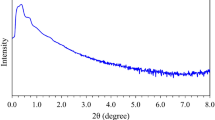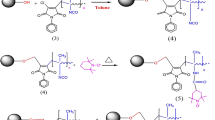Abstract
SYNTHETIC ion-exchange resins of the sulphonated polystyrene type consist essentially of a cross-linked hydrocarbon skeleton to which the functional groups (nuclear sulphonic acid residues) are attached in a rather uniform manner. In water, the resin swells to a degree depending upon the degree of cross-linkage, and thus the size of the pores in the swollen resin gel can be adjusted by varying the proportion of divinylbenzene used in the preparation of the polymer1.
This is a preview of subscription content, access via your institution
Access options
Subscribe to this journal
Receive 51 print issues and online access
$199.00 per year
only $3.90 per issue
Buy this article
- Purchase on Springer Link
- Instant access to full article PDF
Prices may be subject to local taxes which are calculated during checkout
Similar content being viewed by others
References
Pepper, K. W., J. App. Chem., 1, 124 (1951).
Richardson, R. W., Nature, 164, 916 (1949).
Richardson, R. W., J. Chem. Soc., 910 (1951).
Kunin, R., Anal. Chem., 21, 87 (1949).
Deuel, H., Solms, J., and Anyas-Weisz, L., Helv. Chim. Acta, 33, 2171 (1950).
Author information
Authors and Affiliations
Rights and permissions
About this article
Cite this article
PARTRIDGE, S. Ion-Exchange Resins as Molecular Sieves. Nature 169, 496–497 (1952). https://doi.org/10.1038/169496a0
Issue Date:
DOI: https://doi.org/10.1038/169496a0
This article is cited by
-
Sorption of binary liquid mixtures on polymer networks Part I. Determination of surface excess isotherms and free energy functions
Colloid & Polymer Science (1992)
-
The separation of glycine and all peptides from diglycine up to heptaglycine by a cation exchange resin
Chromatographia (1972)
-
Occurrence of Citrulline in Proteins
Nature (1962)
-
�ber das die Keimung von Phycomyces-Sporangiosporen f�rdernde Prinzip hei�-sterilisierter Glucose-Substrate
Archiv f�r Mikrobiologie (1960)
Comments
By submitting a comment you agree to abide by our Terms and Community Guidelines. If you find something abusive or that does not comply with our terms or guidelines please flag it as inappropriate.



